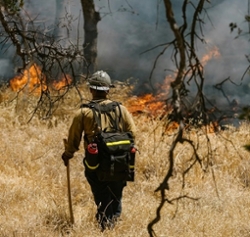It's a New Day in Public Health.
The Florida Department of Health works to protect, promote, and improve the health of all people in Florida through integrated state, county, and community efforts.
Wildfire Readiness
Contact: Florida Health
- 850-245-4444
- health@flhealth.gov
-
Mailing Address
Florida Health
4052 Bald Cypress Way
Tallahassee, FL 32399
Wildfire Safety: Be Prepared, Stay Protected
 Wildfires are unpredictable and dangerous events that can strike quickly, causing widespread damage to homes, communities, and the environment. With climate conditions and vegetation types contributing to fire risks, it’s crucial to stay informed and prepared. In Florida, wildfires are a persistent hazard, especially in dry seasons or during extended periods of drought. Understanding how to protect yourself and your loved ones can significantly reduce the impact of these emergencies.
Wildfires are unpredictable and dangerous events that can strike quickly, causing widespread damage to homes, communities, and the environment. With climate conditions and vegetation types contributing to fire risks, it’s crucial to stay informed and prepared. In Florida, wildfires are a persistent hazard, especially in dry seasons or during extended periods of drought. Understanding how to protect yourself and your loved ones can significantly reduce the impact of these emergencies.
Being prepared for a wildfire is not just about responding quickly; it’s about planning. Taking proactive steps before a fire occurs, knowing what to do during an active wildfire, and following the right actions after the fire has passed can save lives and property. In the dropdowns below, we’ve outlined the essential actions to take before, during, and after a wildfire.
- Before a Wildfire: Preparation is Key
- During a Wildfire: Stay Informed and Safe
- After a Wildfire: Recovery and Support
Create a Wildfire Plan
- Evacuation Routes: Ensure your household has an evacuation plan in place. Know multiple routes in case primary paths are blocked.
- Emergency Kit: Assemble a kit that includes essentials such as water, food, first-aid supplies, medications, clothing, and a flashlight. Visit FEMA's Emergency Kit Checklist for more detailed guidance on assembling a kit.
- Communication Plan: Establish an emergency contact list and ensure all family members understand the plan.
Get Your Home Ready
- Roof and Exterior: Clear debris from roofs, gutters, and areas around the home. Consider fire-resistant materials for siding and roofs.
- Defensible Space: Create defensible space around your home by clearing flammable vegetation at least 30 feet from structures
Stay Informed
- Monitor local news, weather reports, and emergency alerts for updates on wildfire developments.
- Listen to official channels such as the Florida Division of Emergency Management and the Florida Department of Agriculture and Consumer Services for updates on current wildfire status. Stay connected to official current wildfire information from the Florida Depardment of Agriculture and Consumer Services Current WIldfire Hazards page.
Evacuate When Necessary
- If advised to evacuate, do so immediately. Follow the evacuation routes and avoid driving through areas with smoke or fire.
- Sheltering In Place: If evacuation is not possible, stay indoors with windows and doors closed. Use a wet cloth to cover air vents, doors, and windows.
Health and Safety Tips
- Air Quality: Wildfire smoke can severely impact air quality.
- Avoid outdoor activities particularly if you have respiratory issues.
- Stay Hydrated: The heat and smoke from wildfires can lead to dehydration. Drink plenty of water, especially in hot conditions.
- Protective Measures: If you must go outside, wear a mask designed to filter out fine particles. Seek shelter indoors whenever possible.
Assess Damage Safely
- After the fire has been contained, only return home when local authorities give the all-clear. Inspect your property for damage before re-entering.
- Structural Safety: Check for fire damage to roofs, foundations, and electrical systems. Contact professionals for any repairs.
Restore Your Community
- Engage with local emergency services and recovery organizations to help with cleanup efforts. Follow updates from the Florida Division of Emergency Management and the CDC regarding recovery processes and available resources.
Useful Resources
- Ready.gov - Wildfires
- CDC - Wildfire Safety
- FDACS - Wildfire Information
- Florida Disaster - Wildfire Hazards
- USDA Forest Service - Wildfire Risk to Communities
Stay Safe, Stay Prepared
Wildfires can strike at any time, but being prepared can make all the difference. Stay informed, plan, and take action to protect yourself, your family, and your property. The more you prepare, the more resilient you and your community will be when a wildfire occurs.
Remember, recovery doesn’t stop once the fire is out. Stay involved, support local efforts, and utilize available resources to rebuild and strengthen your community. Preparedness is a shared responsibility—together, we can ensure a safer future for all.
Disclaimer: The links and content provided on this page are for informational purposes and your convenience. The Florida Department of Health (DOH) does not endorse, approve, or guarantee the products, services, or opinions offered on external websites. Furthermore, the DOH is not responsible for the accuracy, content, or availability of these external sites. For questions or concerns, please contact the external site directly.



Connect with DOH